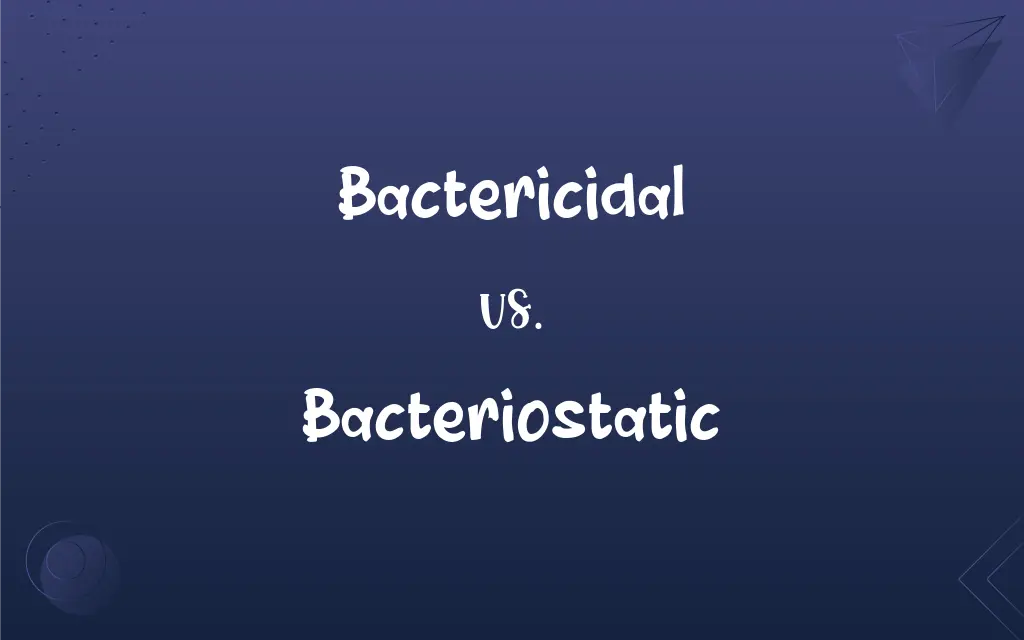Bactericidal vs. Bacteriostatic: What's the Difference?
Edited by Janet White || By Harlon Moss || Updated on October 29, 2023
Bactericidal agents kill bacteria; bacteriostatic agents inhibit their growth.

Key Differences
Bactericidal agents are designed to kill bacteria directly, whereas bacteriostatic agents work by inhibiting the growth and reproduction of bacteria. This difference is crucial when selecting the appropriate treatment for bacterial infections.
Bactericidal agents are often preferred for treating severe or systemic infections, as they can quickly reduce the number of bacteria in the body. On the other hand, bacteriostatic agents may be used for less severe infections or when the patient's immune system can handle the remaining bacteria.
It is important to note that the distinction between bactericidal and bacteriostatic is not always clear-cut, as some agents may have both bactericidal and bacteriostatic effects, depending on the concentration used and the specific bacteria being targeted.
In conclusion, both bactericidal and bacteriostatic agents play a vital role in treating bacterial infections, and the choice between the two will depend on various factors, including the severity of the infection, the patient's immune status, and the specific bacteria involved.
Comparison Chart
Action
Kills bacteria
Inhibits growth
ADVERTISEMENT
Preference
Severe infections
Less severe infections
Immune System Role
Less reliance
More reliance
Concentration
Effective at low
May be effective at high
Bacteria Specific
Depends on bacteria
Depends on bacteria
Bactericidal and Bacteriostatic Definitions
Bactericidal
Bactericidal agents directly kill bacteria.
Penicillin is a bactericidal agent that kills bacteria by disrupting their cell walls.
ADVERTISEMENT
Bacteriostatic
Bacteriostatic agents inhibit the growth and reproduction of bacteria.
Tetracycline is a bacteriostatic agent that inhibits bacterial protein synthesis.
Bactericidal
Bactericidal agents can reduce the number of bacteria in the body quickly.
Bactericidal agents are effective in rapidly decreasing bacterial load.
Bacteriostatic
Bacteriostatic agents are often used for less severe infections.
A bacteriostatic antibiotic may be prescribed for a mild bacterial infection.
Bactericidal
Bactericidal agents play a vital role in treating bacterial infections.
Bactericidal antibiotics are crucial in the treatment of life-threatening bacterial infections.
Bacteriostatic
Bacteriostatic agents rely on the patient's immune system to handle remaining bacteria.
The patient's immune system works with bacteriostatic agents to eliminate bacteria.
Bactericidal
Bactericidal agents may have both bactericidal and bacteriostatic effects.
Some antibiotics can act as bactericidal at high concentrations and bacteriostatic at low concentrations.
Bacteriostatic
Bacteriostatic agents play a vital role in treating bacterial infections.
Bacteriostatic antibiotics are important in the treatment of various bacterial infections.
Bactericidal
Bactericidal agents are often used for severe infections.
A bactericidal antibiotic may be prescribed for a severe bacterial infection.
Bacteriostatic
Bacteriostatic agents may have both bacteriostatic and bactericidal effects.
Some antibiotics can act as bacteriostatic at low concentrations and bactericidal at high concentrations.
FAQs
Can bacteriostatic agents kill bacteria?
Yes, they can have both bacteriostatic and bactericidal effects.
Are bactericidal agents preferred for severe infections?
Yes, they are often preferred for severe infections.
Can bacteriostatic agents inhibit bacterial protein synthesis?
Yes, some bacteriostatic agents work by inhibiting bacterial protein synthesis.
Can bacteriostatic agents work at high concentrations?
Yes, they can be effective at high concentrations.
Do bactericidal agents rely on the immune system?
They rely less on the immune system than bacteriostatic agents.
Are bacteriostatic agents important in treating bacterial infections?
Yes, they are important in the treatment of various bacterial infections.
Is penicillin a bactericidal agent?
Yes, penicillin is a bactericidal agent.
Are bactericidal and bacteriostatic agents vital in treating bacterial infections?
Yes, they both play a crucial role in treating bacterial infections.
Can bactericidal agents inhibit bacteria growth?
Yes, they can have both bactericidal and bacteriostatic effects.
Can bactericidal agents work at low concentrations?
Yes, they can be effective at low concentrations.
Can a single antibiotic be both bactericidal and bacteriostatic?
Yes, it depends on the concentration and the bacteria being targeted.
Are there specific bacteria that bacteriostatic agents target?
Yes, the effectiveness depends on the specific bacteria involved.
What is a bactericidal agent?
A substance that kills bacteria.
What is a bacteriostatic agent?
A substance that inhibits the growth of bacteria.
Are bacteriostatic agents preferred for less severe infections?
Yes, they are often preferred for less severe infections.
Are there specific bacteria that bactericidal agents target?
Yes, the effectiveness depends on the specific bacteria involved.
Do bacteriostatic agents rely on the immune system?
Yes, they rely on the immune system to handle remaining bacteria.
Is tetracycline a bacteriostatic agent?
Yes, tetracycline is a bacteriostatic agent.
Are bactericidal agents effective in rapidly decreasing bacterial load?
Yes, they are effective in quickly reducing the number of bacteria in the body.
Can bactericidal agents disrupt bacterial cell walls?
Yes, some bactericidal agents work by disrupting bacterial cell walls.
About Author
Written by
Harlon MossHarlon is a seasoned quality moderator and accomplished content writer for Difference Wiki. An alumnus of the prestigious University of California, he earned his degree in Computer Science. Leveraging his academic background, Harlon brings a meticulous and informed perspective to his work, ensuring content accuracy and excellence.
Edited by
Janet WhiteJanet White has been an esteemed writer and blogger for Difference Wiki. Holding a Master's degree in Science and Medical Journalism from the prestigious Boston University, she has consistently demonstrated her expertise and passion for her field. When she's not immersed in her work, Janet relishes her time exercising, delving into a good book, and cherishing moments with friends and family.































































